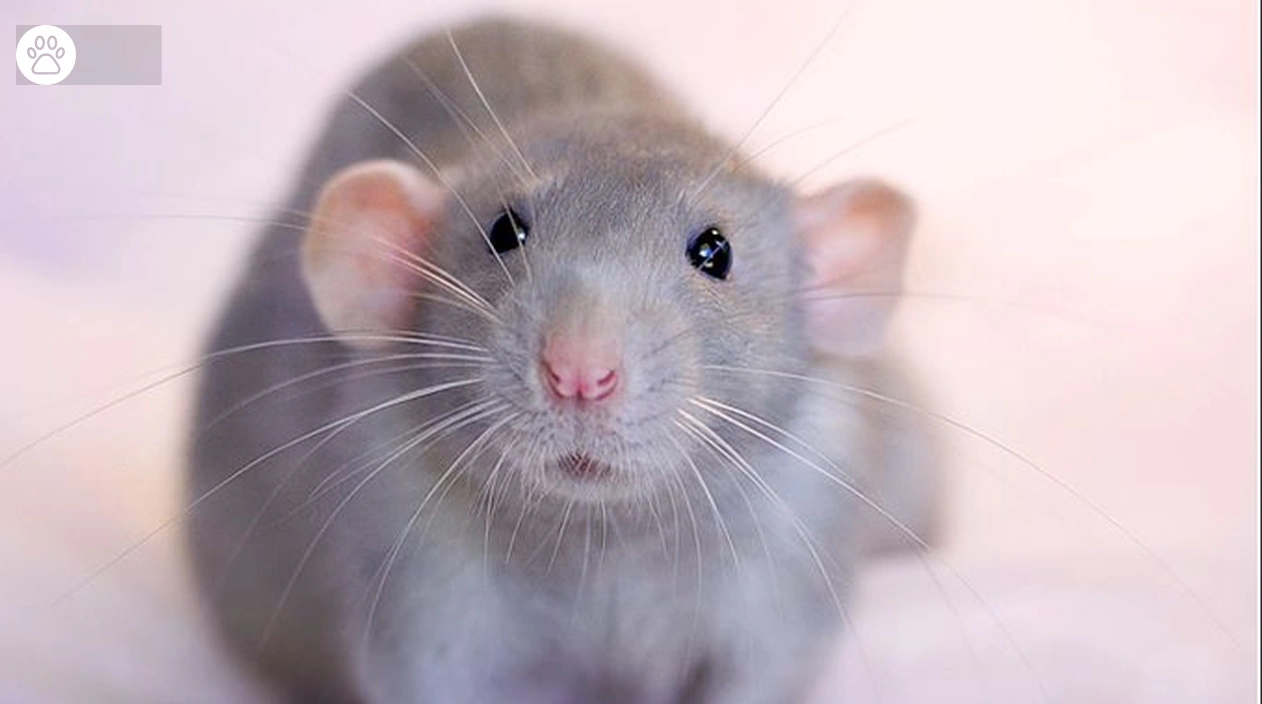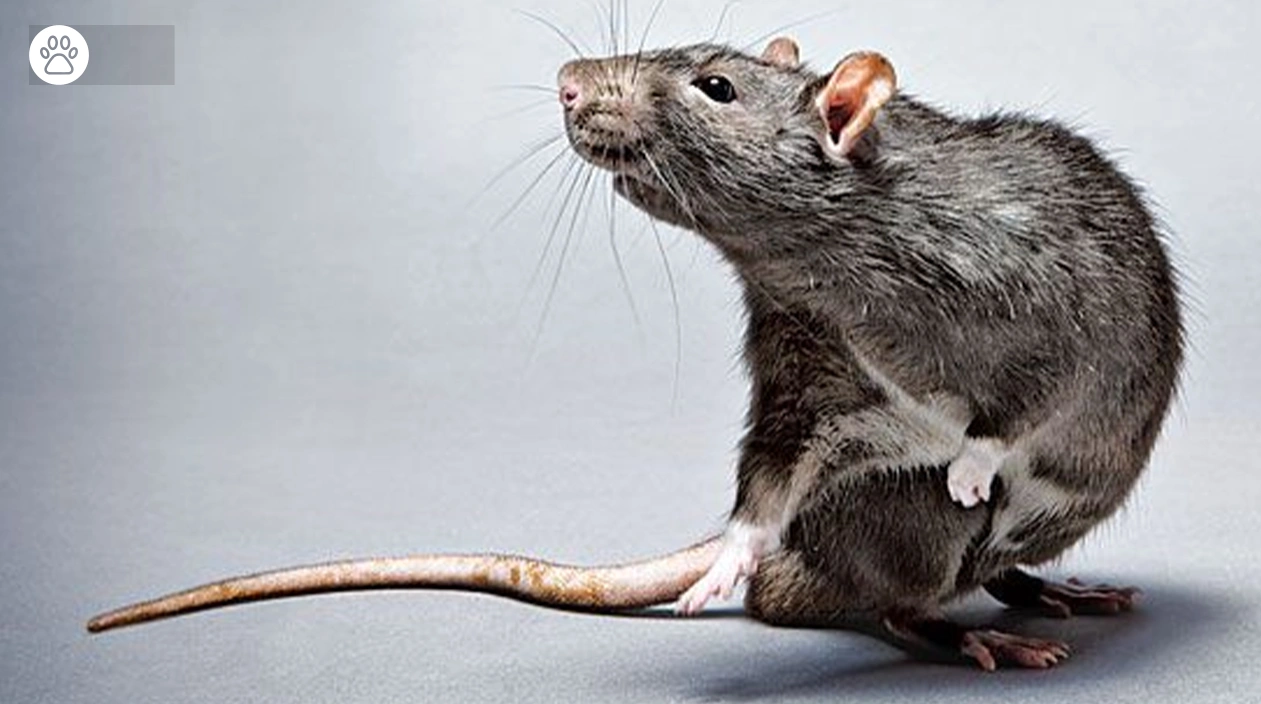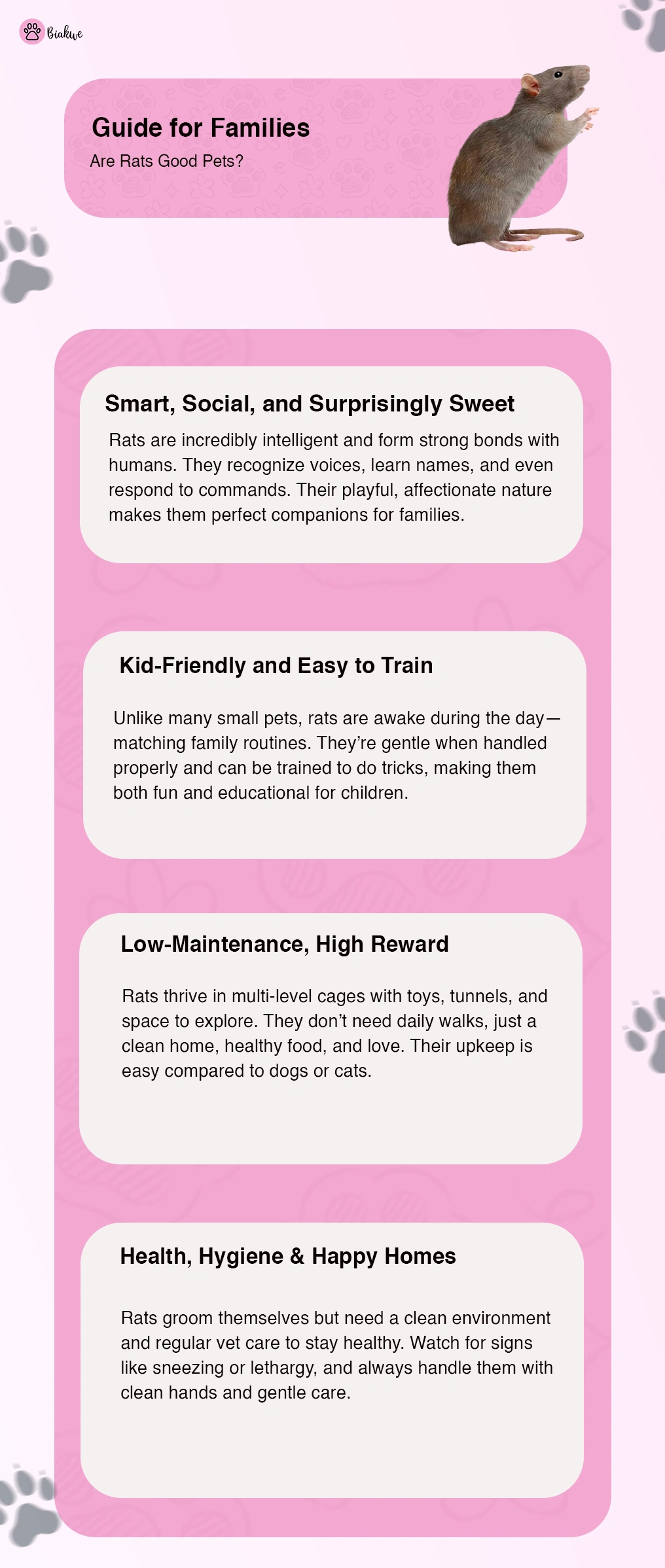Rats aren’t your ordinary pet, but their intelligence, sociability, and low maintenance needs make them very special. Smart rodents, rats are easy to train and build deep connections with their owners. This guide will examine why pet rats are fantastic family pets, from training your pet rat to rat care to children and responsibilities.
Rat Intelligence: Facts and Capabilities
Among the most intelligent species on the planet are rats, chimpanzees, dolphins, and dogs. They have extraordinary minds; in fact, they even have metacognition — in other words, thinking about thinking! Studies have demonstrated that rats can use learned knowledge more quickly to outsmart humans in specific cognitive abilities.
Mice can navigate mazes, remember to press levers for food, and even recognize their reflections in mirrors; these problem-solving capabilities are impressive.

Visit: Natural Pain Relief for Dogs: Safe Alternatives to Medication
Social Nature of Rats: Why They Make Friendly Small Pets
Rats are highly social creatures and are great companions for families. So in the wild, they’ve lived in big family groups, cared for one another, and worked together. As pets, they are very attached to their owners and other rats. They can remember their owners, react to their presence and voice, and love to spend time with them.
Rats are very adept at communicating their needs, and they do so through gestures like reaching to be scooped up or tugging on the bottom of a sleeve to be noticed.
Essential Pet Rat Care: Setting Up a Happy Home
Help Your Pet Live Longer With This Habitat’s Guide. The minimum dimensions for two rats are 2 feet by 2 feet by 2 feet—the larger the dimensions, the better. Look for a powder-coated wire cage with a solid floor base for comfort and good circulation.
Multi-level cages are best because rats are climbers. Provide a nest box for sleeping, and enrich the environment with toys, especially chew toys. Exploratory enrichment: tunnel, rope, hammock, and shelter to explore and exercise.

Check this out: Life with Siamese Cats: An Owner’s Complete Guide
Daily Care Routine: Feeding, Cleaning, and Exercise
Rats are herbivores and need a carefully measured mixture of space-related rat grub, fresh fruit, and vegetable matter. Give 5-10 g of pellets per 100 g of body weight daily. Always have fresh water available — ideally in a glass bottle, which does not encourage bacterial growth.
Although rats are spotless animals, their environment requires some upkeep. Clean a small section of the cage daily and do a deep clean every 3-7 days. Wear bedding that needs to be replaced, and then make sure the cage is all dry before putting your rats back.
Rats need exercise for physical and mental health. The cage should have the minimum amount of space provided, but be sure to give more space for climbing and playing outside the cage (with supervision).
Families who learn about the intelligence of rats, their social nature, and how to care for them can give these small, intelligent, and sociable pets a loving home.
Must Read: Ragdoll: Cat Breed Profile, Characteristics and Care
Training Your Pet Rat: Unlocking Their Potential
Rats are intelligent animals and can be trained to do various things and actions. Use training methods to build rapport and effective communication between you and your pet. Use incentives, like rewards or praise, to promote good behavior.
Start by teaching your rat to come when called by saying their name and rewarding them when they come. Start adding in basic commands such as “up” or “down” by pairing the word with an action of your dog moving up or down, and guiding them gently with your hand or a treat.
Rat training is all about consistency. Train with multiple sessions daily, but do not make it overwhelming for your pet. Rats can learn routines quickly and recognize specific gestures or sounds, making them one of the most trainable smart rodents.

Fun Tricks to Teach Your Pet Rat
After your rat learns a few basic commands, you can teach them fun tricks, highlighting their intelligence. Common tricks include twirling in circles, leaping through hoops, or fetching small items. Use treats to encourage them and take each trick out into small steps. To teach a rat to spin, place a treat in their line of sight and lead their body in a circle until they successfully create a circle.
In addition, rats are masters of solving puzzles and navigating mazes, which offers some mental exercise and helps strengthen that bond with you. They are friendly, small pets, and doing tricks shows their personality and character, so they make great companions for families.
Click to see this: Chiweenie Dog Breed Information and Characteristics
Health and Hygiene: Keeping Your Pet Rat Clean and Healthy
Rats are naturally clean creatures that groom themselves often, so they hardly ever need a bath. Too much bathing can remove and irritate the natural oils from the skin. If your rat becomes dirty or smells unpleasant, you can gently clean it with a damp towel or unscented baby wipes. Bathing should be done occasionally with lukewarm water and a mild pet shampoo; dry them off well afterward to avoid chills.
Regular grooming will include trimming any overgrown nails as needed and checking for signs of skin irritation or parasites. Cleanliness in the cage is essential for overall hygiene and for preventing health problems that stem from poor sanitation.
Must visit this: 5 Easy & Cheap Raw Dog Food Recipes for Beginners
Common Health Issues and Prevention
And like all pet rats, they’re susceptible to specific health issues, including respiratory infections, tumors, or dental problems. Having them chained to a surface without proper ventilation and bedding will put your rat at risk, leading to nasty conditions. A balanced diet that also supports dental health (for herbivores includes hard pellets to chew). Regular vet visits can catch problems early and keep your rat healthy.
With some training, hygiene, and preventive care, you’ll open up your pet rat’s ability to be a lifelong, happy, and healthy companion.
Rats as Family Pets: Compatibility with Children
Rats could be good pets for kids because of their intelligence, sociability, and gentleness. 2010-2018 (Source: RightPet): Rats brought more joy to people aged 10-17 than any other pet. Rats are brilliant animals, making them fun to play with and simple to train. They can be trained to do tricks and to come when called, so they have potential as lovely pets for kids.
Rats are also naturally awake during the day, which matches family schedules and allows for more interaction time. Their social disposition makes them like human companions, and they can form strong relationships with kids. This companionship can help teach children responsibility and empathy.
Safety Considerations and Handling Tips
Although rats are safe pets, they do need to be handled correctly. Children need to be trained to handle rats gently and confidently from a young age. Rats don’t bite or scratch much when not frightened or injured, which can make them a good fit for responsible children. Young children should always be supervised when interacting with rats for the safety of both the child and the rat.
Remind yourself to wash your hands hourly before and after handling Rats. Teach children that rats need their space and shouldn’t be disturbed when sleeping or eating.
Comparing Rats to Other Small Pets
Compared to other small pets such as hamsters, gerbils, and mice, rats tend to prevail in the rankings of intelligence and socialization. Rats are more clever than guinea pigs or hamsters, so they are more entertaining pets. They need less attention (and real estate) than larger pets, like rabbits or guinea pigs, but still provide a rich interaction.
Instead of being nocturnal like some small pets, rats are diurnal. This means they are active mainly during the day and are, therefore, more in line with family schedules in most cases. They’re also easier going and usually handle human interaction better than other small pets.
Why Rats Might Be the Best Choice for Your Family
Rats have so many great traits that they make excellent family pets. They’re smart enough to learn tricks and come when called, but small enough to be manageable with kids. They’re sociable and easy-going, loving almost anyone. They get along well with each other, too, making them an ideal companion with less space than a terrier or tabby.
Rats are also relatively low-maintenance compared to dogs or cats. They don’t require walks and can be happy in an adequately outfitted cage with scheduled play time outside. “These factors, along with their independent nature that allows them to entertain themselves, make them a good family dog.”
Conclusion
In short, rats make great family pets. They’re intelligent and easy to train, and they bond well with children, making them great for teaching responsibility. Given proper rat training and care, rats make excellent pets, especially compared to other small pets such as hamsters and gerbils.
